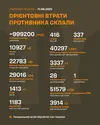1/ A Russian military doctor has spoken frankly in an interview about the atrocious state of Russian military medicine and the lack of medical training given to soldiers. Most of the wounded die, he says, and doctors themselves are treated as 'slaves' by the Russian military.


2/ The Russian Telegram channel Transformer has published a lengthy interview on the experiences of Dr. Alexander Moiseevich Z (a pseudonym). He volunteered for the army at the age of 62 in October 2022 and resigned in June 2024 when he reached the mandatory retirement age of 65. <i></i>
3/ Alexander first workied as a military doctor in the 1970s, during the Soviet era. He says that things were very different then. The Soviet-style military system effectively persisted in Russia until the reforms of then-Defence Minister Anatoly Serdyukov were enacted in 2008. <i></i>
4/ Serdyukov's reforms were intended to professionalise the army and reduce it in size. While some of these objectives were achieved, Alexander says that "the medical component of the armed forces was recognized as excessive and was cut," decimating the military medical service.

5/ "Under Serdyukov, hospitals were liquidated en masse, the system of sanatorium and resort treatment was almost completely destroyed, and the system of personnel training was cut." This turned out to have very negative consequences in the current war, as Alexander notes. <i></i>
6/ "Military medicine is something that can be quickly destroyed, and it takes 10-15 years to restore. The problem is aggravated by the fact that civilian medicine has also been optimised to the point of incapacity, which the pandemic has demonstrated to us in all its glory." <i></i>
7/ Alexander says that civilian doctors are unfamiliar with the type of injuries received in warfare and are at a loss when presented with a complex case that needs to be rapidly triaged, such as prioritising which pieces of shrapnel to pull out of a wounded soldier's body first. <i></i>
8/ Evacuation on the Ukrainian battlefield is usually difficult and often impossible due to the constant threat of drone attacks (see the thread below for a more detailed perspective on this). Alexander highlights the importance of self-care for soldiers.
Unroll available on Thread Reader
9/ "Each soldier must be able to provide first aid to himself and his comrade. And in a comprehensive manner – it is necessary not only to apply a tourniquet, pack the wound, but also to relieve pain, properly fix the limb, disinfect. <i></i>
10/ "What difference does it make whether a soldier dies from blood loss or from an infection? But most are sure that it is enough to stop the bleeding - and then let the doctors figure it out. The level of sanitary training in the troops is extremely low. <i></i>
11/ "And this is the main reason for wound mortality.
Of course, the thing is that now any training of soldiers, including the one based on providing medical care to themselves on the battlefield, is pure profanation! <i></i>
12/ "They will show you how to tie a tourniquet, but that's all the training you get. At the same time, it is IMPOSSIBLE to use what is issued to soldiers as a standard!
13/ "The cheapest Chinese tourniquet (and probably also expired) immediately breaks, and the soldier is forced to die from blood loss."
Unroll available on Thread Reader
14/ A "catastrophically low level of medical training in the troops" is the leading cause of the loss of limbs. According to the Kalashnikov Center for Tactical Medicine, a third of amputations are due to improper tourniquet usage. Alexander comments:
15/ "An applied tourniquet or tourniquet is not a way to stop bleeding, it is a way to stop the blood supply to the limb."
The safe time is an hour, and every 15 minutes the tourniquet must be loosened. <i></i>
16/ "But with us, as often as not, a wounded person comes, and his arm is already purple. The tourniquet was applied two days ago, and it was never removed. Well, that's it - now it's time to cut." <i></i>
17/ Soldiers are often not provided with medical kits and have to buy them at their own expense. Additionally, painkillers are often missing from aid kits because bored or addicted soldiers consume them as recreational drugs. <i></i>
18/ As a result of all of these issues, battlefield mortality is very high. Alexander gives the example of a shell which explodes and strikes ten men with shrapnel, injuring all of them. <i></i>
19/ One man dies immediately. Two more will die within half an hour from unsurvivable wounds. Three could be saved if given prompt treatment within an hour. This usually isn't possible due to the inability to carry out evacuations by helicopter. <i></i>
20/ Of the five remaining, three have received immobilising injuries. They could be saved if given first aid by their comrades and evacuated within 4-5 hours. However, because of the constant threat of drones a timely evacuation is often not possible. So the immobilised die too. <i></i>
21/ "Today, seriously wounded soldiers from assault units have no chance at all. They die in the grey zone, many commit suicide to get rid of suffering. <i></i>
22/ "Only the very resilient and very lucky end up in hospitals – those who were able to return to their positions themselves or who were carried out, given first aid, and then quickly taken to the hospital." <i></i>
23/ The last two men are 'walking wounded'. They must make their way back to their own positions, or to an evacuation point 5-10 km behind the front line. There is still a threat of drones, but they have a better chance of being collected by a vehicle.
24/ "Out of nine wounded by a shell explosion, only two slightly wounded survive, and even then with the risk of serious complications. If a wounded person gets to a hospital, he can count on qualified care. But most do not survive to get to the hospital." <i></i>
25/ This, he says, is why Russian casualties are so high. In Afghanistan, for every man killed four wounded men survived. "Today I would dare to assume that for every wounded person who survives, there are at least two killed and died of wounds." <i></i>
26/ The Russian Ministry of Defence claims that 98% of wounded men treated in hospitals return to duty. Alexander says that this figure is faked. "It turns out that hospital mortality is practically non-existent, somewhere around 0.4%. These are purely accounting tricks." <i></i>
27/ "If a wounded man dies in his bed, he can be “fired retroactively”. The death certificate says that he was admitted dead. Who will check? Sometimes the date of death was even shifted by two weeks. The bosses need a pretty report - that's what you get." <i></i>
28/ According to Alexander, Ministry of Defence quotas for the number of wounded men returning to duty are the reason why so many incurably infected or badly injured men – including men who have lost limbs – have been sent back to frontline duty despite clearly being unfit. <i></i>
29/ "The Ministry of Defence gives such an instruction that the person who signed the contract is their property, like a serf. They bought the man, so they cannot let him go free. And then a simple manipulation comes into play. Can a legless man work as a clerk at headquarters? <i></i>
30/ "He can, therefore he should be declared fit for military service and returned to his owner? And the owner no longer looks at the fitness category – if he is fit, then go on an assault." <i></i>
31/ Many of the doctors working for the army are civilians who were mobilised or have volunteered for service. However, they find themselves "slaves of the Ministry of Defence, and are forced to live and work in absolutely brutal conditions."

32/ "I have seen young doctors literally faint from fatigue after a 14-hour shift. And this is every day without days off. The conditions, frankly speaking, are inhumane. <i></i>
33/ "As a reaction, people burn out emotionally, become irritable, aggressive. For them, the wounded are not an object of care, but a source of problems." <i></i>
34/ Some of the wounded make themselves a source of problems through their own misbehaviour. Alexander speaks of "frankly marginal contingents" who joined to make a quick buck: "they only speak in obscenities, and they can even hit you".

35/ Military doctors lack basic supplies and are unable to get them in the ruined towns and villages behind the front line. "It's not even about medicines, but about consumables. Let's take banal hydrogen peroxide, which is used to peel bandages off wounds." <i></i>
36/ "Hospitals are regularly supplied with it, but according to peacetime standards. We are officially not at war, there is no martial law, and there is not even a state of emergency. <i></i>
37/ "Accordingly, the antiseptic quickly runs out, and bandages have to be torn off "dry", which is very painful. The wounded perceive this almost as deliberate mockery." <i></i>
38/ An increasing number of military casualties have been transferred to civilian hospitals. This has caused significant security problems, including soldiers attacking and raping civilian patients, or calling prostitutes to their wards.
Unroll available on Thread Reader
39/ Alexander says that the increasing 'civilianisation' of military medicine is the result of "the unstoppable outflow of [medical] personnel" burned out by high workloads and terrible working conditions. <i></i>
40/ However, this has led to greater strain on underpaid and overworked civilian doctors. It has increased the exodus of civilian medical staff, causing the quality of the medical care available to both soldiers and civilians to deteriorate. <i></i>
41/ Alexander advises would-be volunteers that they face a low chance of survival, especially if they join an assault unit. "As a doctor, I have to warn them honestly: the survival rate of soldiers at the front today is many times lower than in Afghanistan or the Chechen war." <i></i>
42/ "Do not skimp on buying a first aid kit, do not hope that you will be given one. Do not count on quality instruction in training, there you are prepared for death, not for survival. <i></i>
43/ "At least listen to a course in tactical medicine on YouTube, practice applying a tourniquet, bandaging yourself and your comrade. This will increase your chances of survival by about a third if you are wounded." /end <i></i>
Sources:
 t.me/Transormator_T…
t.me/Transormator_T… t.me/Transormator_T…
t.me/Transormator_T… t.me/Transormator_T…
t.me/Transormator_T… t.me/Transormator_T…
t.me/Transormator_T… t.me/Transormator_T…
t.me/Transormator_T… t.me/Transormator_T…
t.me/Transormator_T… jamestown.org
jamestown.org


















